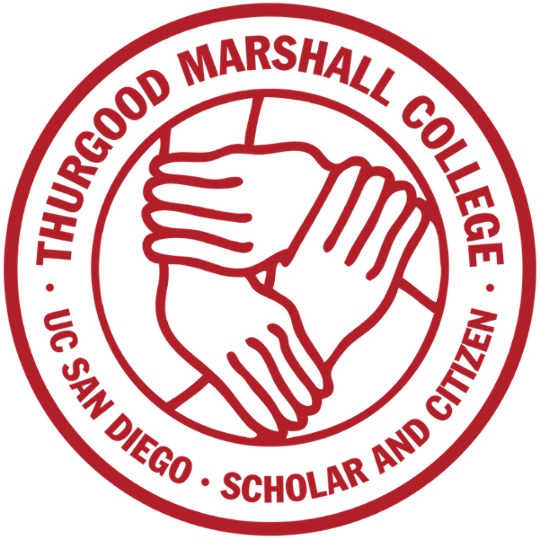Mission, Vision, & Values
Mission, Vision, & Values
As Thurgood Marshall College celebrated its fiftieth anniversary in 2020, the moment presented itself as an opportunity to revise the College’s vision, mission, and values. This resulted in a four-year endeavor to ensure the College remained true to its founding principles in light of the significant social and institutional changes of the past half century. Undergraduate students, alumni, faculty, and staff (past and present) all contributed to this revision. TMC’s vision, mission, and values statement below ensure that the College continues to participate actively in the ongoing growth and transformation of UC San Diego as a public university.
Vision
Thurgood Marshall College’s ongoing vision is defined by the original demands of the Lumumba Zapata Coalition, an alliance of Black and Chicano/a/x UC San Diego students who named themselves after revolutionary leaders Patrice Lumumba and Emiliano Zapata in order to demand from within the transformation of the university and, ultimately, larger society. Marshall College envisions a general education experience that redefines what it means to be a scholar and citizen by empowering members of the Marshall community to: explore their own complex identities, analyze structures of power and privilege within society, and enact systemic change in the name of justice.
Mission
At Thurgood Marshall College, we are dedicated to empowering students from all majors to become scholars critically aware of the complex histories of ongoing social struggle and of the roles they play in shaping the future. Marshall College furthermore centers mutuality and recognizes that students themselves teach and transform the College through their very presence and participation in it.
Values
Interdisciplinary Learning
Through an emphasis on interdisciplinarity, our students develop a consciousness of the ways in which our society transforms over time, the relevance of identities within society, and their own capacity to effect societal change through collective movements. Our core sequence centers insights from history, ethnic studies, cultural studies, political science, sociology, writing studies, and gender studies. Additional general-education requirements include courses in mathematics, physical and biological sciences, humanities, and the arts.
Community Cultural Wealth
Members of Thurgood Marshall College bring to the university a wealth of cultural knowledge shaped by their experiences and communities. Honoring this deep cultural knowledge equally alongside interdisciplinary learning resists racist hierarchies, ensures centering student voices in the classroom, and promotes the inclusion of “marginalized” ways of knowing in the university. We develop our collective knowledge within and beyond the classroom by centering our complex identities and social positions in our learning.
Coalition Building
Pursuing interdisciplinary learning and centering community cultural wealth enable students to critically understand themselves as scholars and citizens. Thurgood Marshall College rejects a narrow definition of “citizen” that relies on legality and documentation. Like the College’s namesake Justice Thurgood Marshall, our scholars and citizens value critiquing the status quo and breaking down borders in order to build coalitions according to a radical hope for an equitable future. We prioritize self-advocacy alongside collective accountability, personal responsibility alongside communal care, and building alliances from the ground up in the name of comprehensive institutional transformation and structural change.
Educational Philosophy
The educational philosophy of Marshall College is guided by the belief that regardless of a student’s major, the college experience must include an understanding of one’s role in society. The distinctive core sequence, which serves as the centerpiece of the College’s general education requirements, emphasizes a critical examination of American society. This three-quarter sequence, “Dimensions of Culture—Diversity, Justice, and Imagination (DOC),” challenges students to develop a historically grounded understanding of the diverse experiences that have shaped U.S. society. DOC is designed to be an interdisciplinary curriculum that explores the promise of the nation’s founding ideals juxtaposed to collective struggles to realize those ideals for all communities. Other general-education requirements include courses in mathematics, physical and biological sciences, humanities, and the arts.
Wishing to uphold the ideals set forth by the college’s namesake, students are encouraged to develop their skills not only as scholars, but also as engaged citizens. Therefore, it is our belief that scholarship and social responsibility are mutually compatible and essential. In this regard, our students receive academic credit for participating in the Partnership Schools Program and Partners-at-Learning Program (PAL) by taking courses that train and place them as tutors and mentors in local elementary schools and high schools including Gompers Preparatory Academy, Lincoln High School in Southeast San Diego, and The Preuss School UC San Diego. Because this activity shares importance with other exciting academic experiences, completion of one of these specific public service courses satisfies an upper-division general-education requirement.
Further underpinning the educational philosophy of Marshall College is the belief that the best preparation for a complex, interdependent, and rapidly changing world is a diverse course of study, complemented by in-depth study in a major of the student’s choice. This educational approach has several advantages:
- It guarantees a basic understanding of the principal branches of knowledge: humanities and arts, social sciences, natural sciences, and quantitative analysis.
- It enables students with specific goals to work in their chosen field of study as first-year students.
- It allows students who have not decided on a major to sample an array of potential majors while simultaneously satisfying the general education requirements of the college.
*Non-Discrimination Statement
In accordance with applicable Federal and State law and University policy, the University of
California does not discriminate, or grant preferences, on the basis of race, color, national origin,
religion, sex, disability, and/or other protected categories.
More information about Proposition 209 can be found here.
More information about the University of California Anti-Discrimination Policy can be found here.
